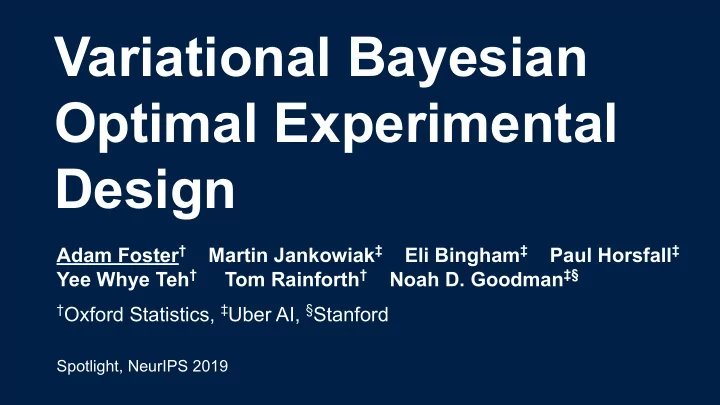

Variational Bayesian Optimal Experimental Design Adam Foster † Martin Jankowiak ‡ Eli Bingham ‡ Paul Horsfall ‡ Yee Whye Teh † Tom Rainforth † Noah D. Goodman ‡§ † Oxford Statistics, ‡ Uber AI, § Stanford Spotlight, NeurIPS 2019
Adaptive experimentation Inference θ Data analyzed Model fitted Design Experimental setup Controlled by experimenter y d Observation Data generated Response sampled
What makes a good experiment? Which would you prefer?
What makes a good experiment? Which would you prefer? Which would you prefer?
Bayesian experimental design 𝜄 : latent variable of interest d : design y : data d 𝜄 posterior prior likelihood y
Inference Design Observation Which would you prefer? Low information gain Which would you prefer? High information gain
Expected information gain (EIG) Expected reduction in entropy from the prior to the posterior prior entropy posterior entropy (Lindley, 1956)
Estimating the EIG is difficult! posterior prior simulate samples “Doubly intractable”
Our contribution: Variational estimators of the EIG ● Bound EIG to turn estimation into optimization ● This removes double intractability approximate marginal density
Variational estimator Implicit? Consistent? Marginal Posterior Variational NMC Marginal + likelihood
Much faster convergence rates! Variational rate Nested Monte Carlo rate T = computational cost
Intuition: amortization ● Approximate the functional form rather than computing independent point estimates NMC = Nested Monte Carlo
Experiments: EIG estimation accuracy Posterior Ours Marginal n/a n/a n/a n/a n/a n/a n/a n/a VNMC n/a n/a Marginal + likelihood n/a n/a n/a n/a NMC Baseline n/a n/a n/a n/a Laplace n/a n/a LFIRE DV
Which would you prefer? Experiments: End-to-end adaptive experimentation Parameter recovery (RMSE)
Thank you Implementation in Pyro docs.pyro.ai/en/stable/contrib.oed.html Full paper papers.nips.cc/paper/9553-variational-bayesian-optimal-experimental-design.pdf
Recommend
More recommend